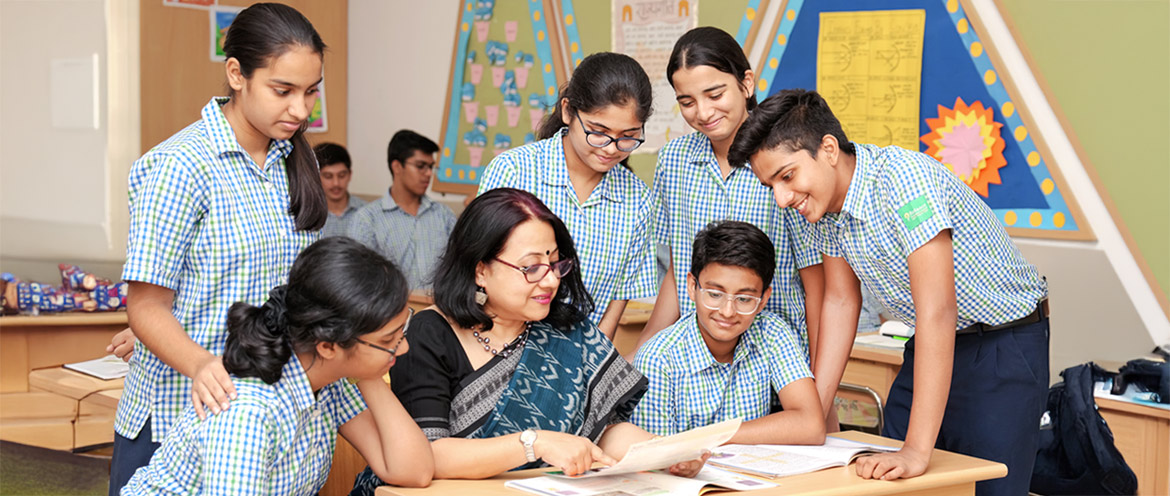Academics
At Reliance Foundation School, academics go beyond traditional learning to inspire curiosity, build competencies, and prepare students to excel in a dynamic world. The school's programmes are thoughtfully designed to nurture critical thinking, creativity, and problemsolving, equipping students with the skills and values needed for lifelong success. With a focus on competency-based education, the curriculum integrates innovation, experiential learning, and holistic development to create a transformative learning experience.
The school's academic programmes are designed to nurture intellectual growth, foster experiential learning, encourage creative exploration, promote emotional development, build social skills, enhance physical well-being, and instil sound values and character.
A favourable student-teacher ratio of 15:1 ensures that every student receives personalised attention, providing a focused environment for academic success.
The curriculum is thoughtfully designed to address the challenges of the modern world. Vertical integration ensures a gradual progression of skills, knowledge, and applications from one grade to the next. Horizontal alignment creates an interdisciplinary approach, blending concepts across subjects for a cohesive learning experience.
The school places a strong emphasis on fostering 21st-century skills like critical thinking, collaboration, communication, and creativity. Inquiry-based learning, experiential activities, and problem-solving approaches ensure students are prepared for lifelong learning and achieve the expected outcomes.
Pedagogical practices like storytelling, play-based learning, and scientific enquiry empower students to tackle real-world problems and think critically about solutions.
The curriculum encourages students to think, explore, and express their ideas freely, fostering meaningful and hands-on learning experiences that inspire creativity and innovation. Field trips and educational excursions are integrated into the curriculum to provide students with practical exposure and enrich their understanding of various concepts.
The curriculum promotes holistic learning by connecting knowledge across different disciplines. This approach enhances students' understanding of concepts and their application in real-life contexts.
Art is seamlessly woven into the curriculum to make learning joyful and experiential while fostering creativity and critical thinking. Subject Enrichment Activities (SEA) are thoughtfully integrated with art to enhance learning experiences. These activities are aligned with the National Education Policy (NEP) and National Curriculum Framework (NCF), which provide a comprehensive approach to student assessment.
Skill subjects such as coding, design thinking, and problem-solving are introduced from middle school onwards. These subjects equip students with future-ready competencies, innovative thinking, and practical skills, preparing them to excel in their academic pursuits and adapt to real-world challenges.
STEAM is seamlessly integrated into the curriculum across all grades, starting with foundational projects like Parachute Making and Boat Construction in Pre-primary. It progresses to advanced initiatives in Senior School, such as Doers and Fliers, Chemsim, Solaris Orbitron (Mobile Application), Insignia (Indian Sign Language Converter/Generator), Dewumen, and Analeptic Masks. These projects foster inquiry, creativity, and innovation, ensuring students engage in meaningful and dynamic learning experiences at every stage of their education.
This writing strategy enhances creative and organized expression by encouraging students to write with a specific Role, Audience, Format, and Topic. It makes learning enjoyable while developing essential writing skills.
The curriculum embraces design thinking to build a structured framework for problem-solving. Through activities like brainstorming, prototyping, and testing solutions, students develop critical thinking and innovative approaches to challenges.
PBL is embedded in the curriculum to encourage hands-on, collaborative, and inquiry-based learning. Students work on real-world projects that require them to research, innovate, and apply concepts, fostering deeper engagement and understanding.
Based on assessment results, the school designs individualised academic support programmes to help students bridge learning gaps and achieve their potential.
